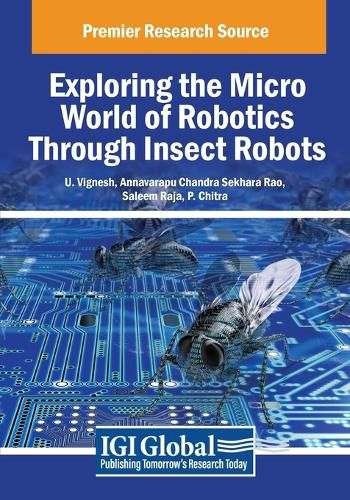Readings Newsletter
Become a Readings Member to make your shopping experience even easier.
Sign in or sign up for free!
You’re not far away from qualifying for FREE standard shipping within Australia
You’ve qualified for FREE standard shipping within Australia
The cart is loading…






This title is printed to order. This book may have been self-published. If so, we cannot guarantee the quality of the content. In the main most books will have gone through the editing process however some may not. We therefore suggest that you be aware of this before ordering this book. If in doubt check either the author or publisher’s details as we are unable to accept any returns unless they are faulty. Please contact us if you have any questions.
Insect robots, inspired by the agility and resilience of insects, are emerging as innovative tools in disaster recovery efforts. These small, agile robots are designed to navigate through tight spaces, unstable environments, and hazardous conditions that are often inaccessible to human responders. Their ability to operate autonomously or in swarms makes them particularly effective in large-scale disasters where speed and efficiency are crucial. As technology continues to advance, insect robots are poised to play an increasingly vital role in enhancing the effectiveness and safety of disaster recovery operations, providing invaluable support in the race against time to save lives. Exploring the Micro World of Robotics Through Insect Robots delves into the futuristic field of insect robotics and their pivotal role in disaster recovery scenarios. Encompassing a diverse array of subjects ranging from microcontroller principles and sensor advancements to ethical considerations and policy implications, this book offers a comprehensive perspective on the transformative potential of insect-inspired technologies in disaster response efforts. Covering topics such as advanced algorithms, machine learning, and robot swarms, this book is an excellent resource for emergency management professionals, robotics engineers and developers, public safety and security agencies, academicians, researchers, policymakers, and more.
$9.00 standard shipping within Australia
FREE standard shipping within Australia for orders over $100.00
Express & International shipping calculated at checkout
This title is printed to order. This book may have been self-published. If so, we cannot guarantee the quality of the content. In the main most books will have gone through the editing process however some may not. We therefore suggest that you be aware of this before ordering this book. If in doubt check either the author or publisher’s details as we are unable to accept any returns unless they are faulty. Please contact us if you have any questions.
Insect robots, inspired by the agility and resilience of insects, are emerging as innovative tools in disaster recovery efforts. These small, agile robots are designed to navigate through tight spaces, unstable environments, and hazardous conditions that are often inaccessible to human responders. Their ability to operate autonomously or in swarms makes them particularly effective in large-scale disasters where speed and efficiency are crucial. As technology continues to advance, insect robots are poised to play an increasingly vital role in enhancing the effectiveness and safety of disaster recovery operations, providing invaluable support in the race against time to save lives. Exploring the Micro World of Robotics Through Insect Robots delves into the futuristic field of insect robotics and their pivotal role in disaster recovery scenarios. Encompassing a diverse array of subjects ranging from microcontroller principles and sensor advancements to ethical considerations and policy implications, this book offers a comprehensive perspective on the transformative potential of insect-inspired technologies in disaster response efforts. Covering topics such as advanced algorithms, machine learning, and robot swarms, this book is an excellent resource for emergency management professionals, robotics engineers and developers, public safety and security agencies, academicians, researchers, policymakers, and more.